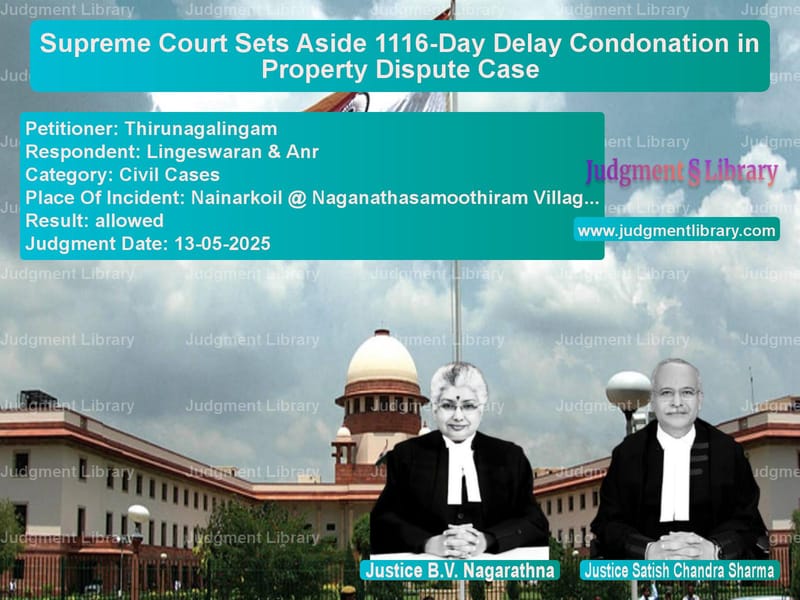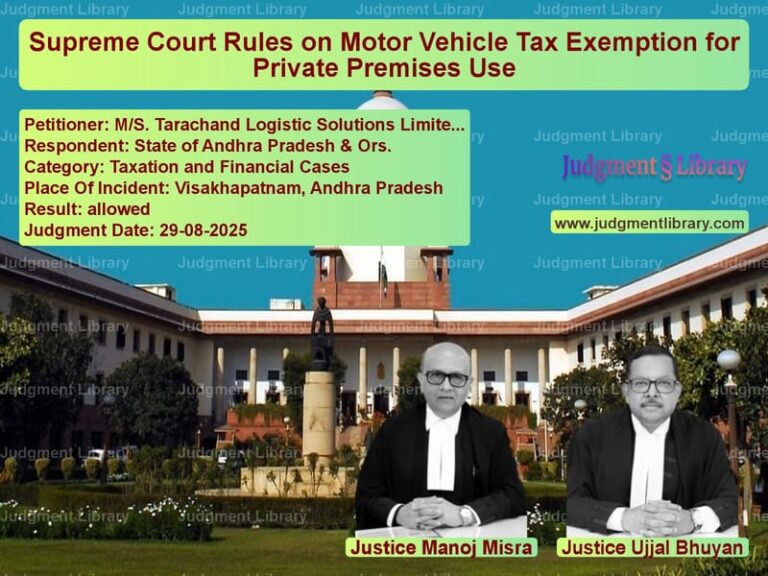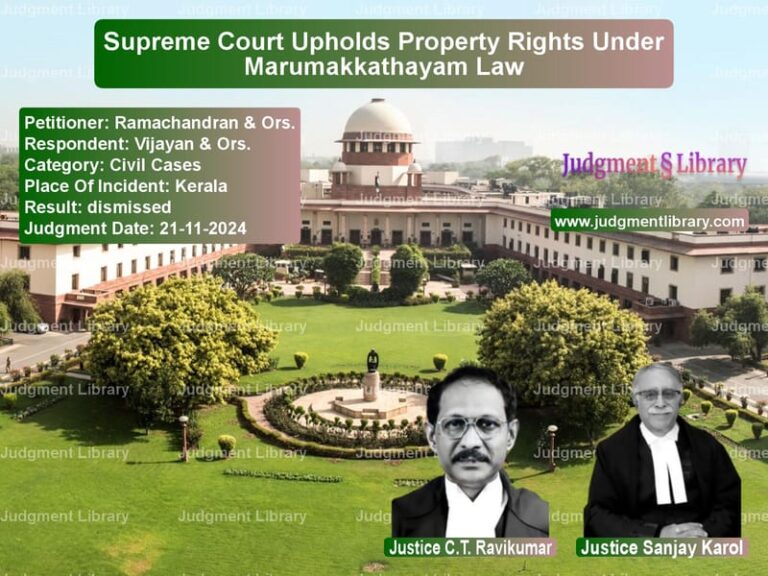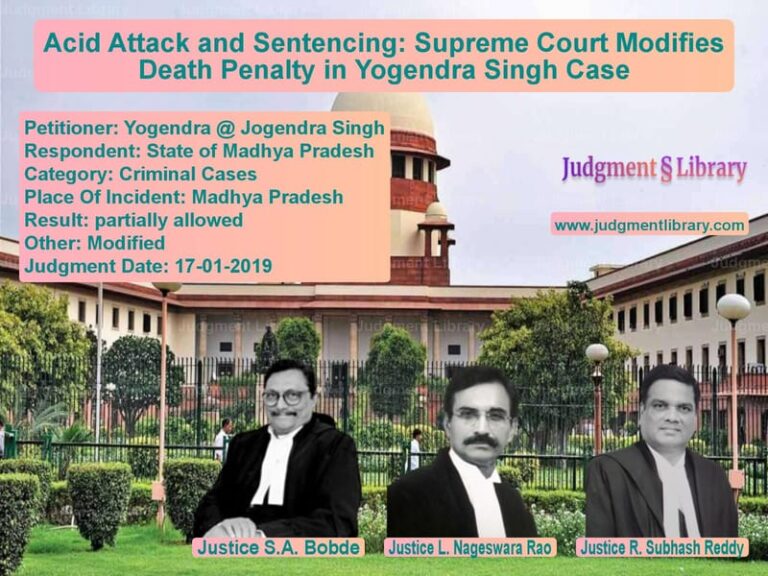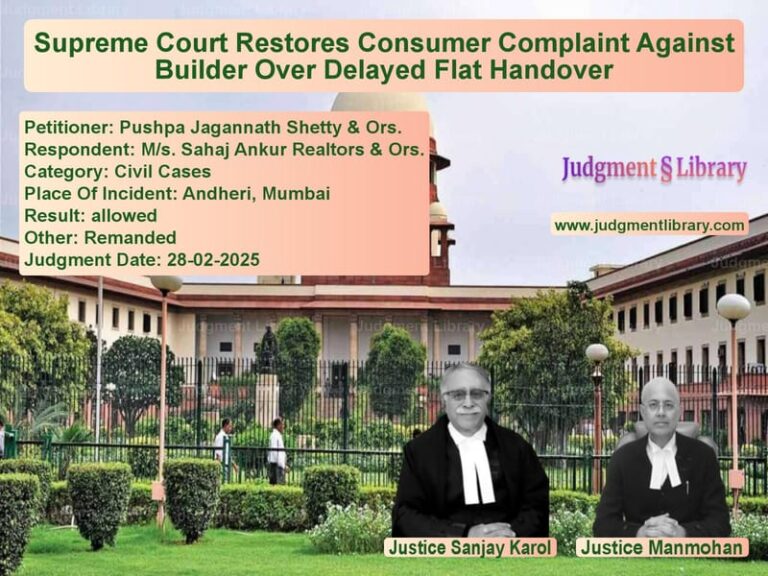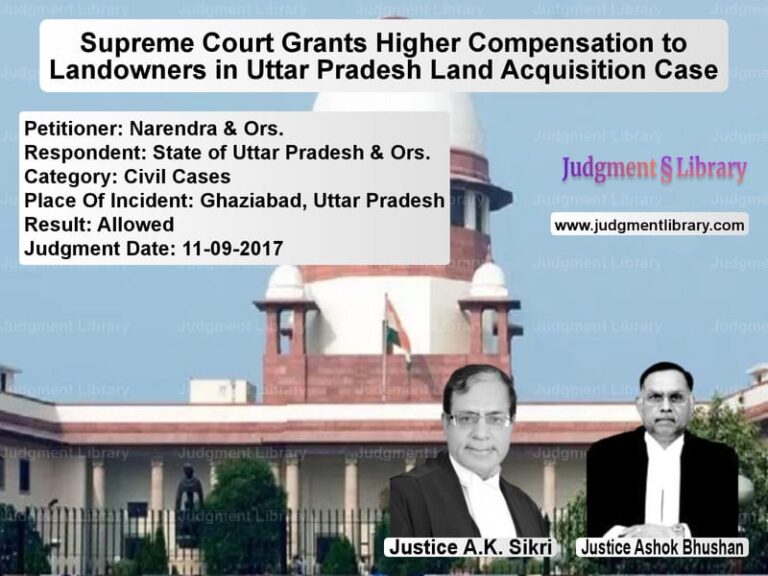Supreme Court Sets Aside 1116-Day Delay Condonation in Property Dispute Case
In a significant ruling that reinforces the importance of timely legal action and prevents abuse of judicial process, the Supreme Court of India recently delivered a judgment that sets aside the condonation of an enormous 1116-day delay in filing an appeal in a property dispute case. The case of Thirunagalingam versus Lingeswaran & Another, decided on May 13, 2025, by a bench comprising Justice B.V. Nagarathna and Justice Satish Chandra Sharma, addresses crucial legal principles regarding limitation periods, the finality of judicial decisions, and the circumstances under which courts should condone delays in legal proceedings. This judgment serves as an important reminder that while courts aim to do substantial justice, they cannot ignore procedural requirements and statutory limitations that form the backbone of an orderly judicial system.
The Property Dispute and Legal Proceedings
The case originated from a sale agreement executed on August 17, 2015, between the appellant Thirunagalingam and respondent Lingeswaran for a consideration of Rs. 3 lakhs regarding a property situated at Nainarkoil @ Naganathasamoothiram Village. When the respondent failed to execute the sale deed as agreed, the appellant filed a civil suit before the Sub Court, Paramakudi, on September 21, 2015, seeking specific performance of the sale agreement. During the pendency of this suit, the respondent executed a sale deed in favor of the second respondent on November 26, 2015.
The legal journey took several twists and turns as both respondents filed their written statements but subsequently stopped appearing in the matter. Consequently, the trial court proceeded against them ex-parte and passed an ex-parte decree on February 7, 2017. The appellant then preferred an execution petition, and the sale deed was eventually executed in his favor.
The respondents then initiated the first round of litigation by filing applications under Order IX Rule 13 of the Code of Civil Procedure to set aside the ex-parte decree, along with applications for condonation of delay of 712 and 467 days respectively. The trial court allowed these applications, but the High Court reversed this decision in revision petitions filed by the appellant. The respondents approached the Supreme Court through Special Leave Petitions, which were dismissed on February 25, 2022, thereby affirming the ex-parte judgment and decree.
The Second Round of Litigation
After the matter attained finality with the Supreme Court’s dismissal of their Special Leave Petitions, the respondents initiated a second round of litigation by preferring an appeal against the ex-parte judgment and decree. This appeal was barred by limitation by 1116 days, and accordingly, the respondents filed an application for condonation of this enormous delay under Order XLI Rule 3A read with Section 151 of the CPC before the First Appellate Court.
The First Appellate Court dismissed the application for condonation of delay on February 8, 2023. However, the respondents preferred a revision before the High Court, which set aside the First Appellate Court’s order through its impugned order dated April 25, 2023. The High Court condoned the delay of 1116 days upon payment of costs of Rs. 1 lakh by the respondents to the appellant. This decision of the High Court prompted the appellant to approach the Supreme Court through the present appeal.
Arguments Presented by the Appellant
The appellant’s counsel made several compelling arguments challenging the High Court’s decision to condone the massive delay. “The learned counsel for the appellant submitted that no clear explanation is forthcoming for the delay that was caused in the first round of litigation while filing the application under Section 5 of the Limitation Act, 1963, to condone the delay under Order IX Rule 13 of the CPC.” The appellant emphasized that the respondents had already failed to provide satisfactory explanations for earlier delays of 467 days and 712 days, which had been scrutinized and rejected by the High Court in earlier proceedings and affirmed by the Supreme Court.
The appellant further argued that “the Respondents cannot reagitate the very same question which has attained finality in the earlier proceedings.” This argument highlighted the principle of finality in litigation, where matters once decided by the highest court should not be reopened through alternative procedural routes.
Regarding the High Court’s reliance on the N. Mohan v. R. Madhu case, the appellant contended that “the High Court erred in applying the decision of the Hon’ble Supreme Court in N. Mohan v. R. Madhu (2020) 20 SCC 302 in the facts of the present case.” The appellant distinguished the facts, noting that in N. Mohan’s case, the respondents were never served with suit summons, whereas in the present case, “the respondents/defendants were properly served with the suit summons, they appeared and filed a Vakalatnama, and also filed their written statement.”
The appellant also questioned the bona fides of the respondents’ conduct, stating that “the respondents/defendants were negligent in not filing the appeal in time and the delay has not been properly explained.” This argument went to the heart of the matter – whether the respondents had demonstrated sufficient cause for the enormous delay of 1116 days.
Arguments Presented by the Respondents
The respondents’ counsel vehemently defended the High Court’s decision, arguing that “the non-representation before the Trial Court by respondent no. 1/defendant no. 1 and respondent no. 2/defendant no. 2 was neither wilful nor wanton.” They maintained that they had provided plausible explanations for the delay and that the High Court had been convinced by these explanations.
The respondents placed significant reliance on the N. Mohan case, contending that “the High Court correctly relied upon the judgment of N. Mohan (supra) while passing the impugned order dated 25.04.2023, as it squarely applies to the instant case.” They argued that the High Court had exercised its judicial wisdom properly in applying this precedent.
A crucial legal argument advanced by the respondents was that “it is trite law that the application filed under Order IX Rule 13 of the CPC and the application filed under Order 41 Rule 3(A) of the CPC stand on a different footing.” They cited Bhanu Kumar Jain v. Archana Kumar to support their position that different legal remedies available under the CPC operate independently.
The respondents also invoked Section 14 of the Limitation Act, arguing that “the time taken during the pendency of the Petition under Order IX Rule 13 of the CPC and also the revision petitions before the various judicial forums necessarily have to be excluded.” They emphasized their compliance with the High Court’s direction to pay costs of Rs. 1 lakh as evidence of their bona fides.
The Supreme Court’s Analysis and Reasoning
The Supreme Court conducted a thorough analysis of the facts and legal principles involved. The Court noted that “the point at issue for consideration is whether the delay is to be condoned or not, and if the delay is justifiable, then whether the case should be allowed to proceed on merits, or be dismissed on procedural grounds.”
The Court first addressed the High Court’s reliance on the N. Mohan case, observing that “on comparison, the facts of the said case are different from the case at hand.” The Court elaborated: “In the said case, the summons to the Respondents was sent to their old address, and the same was returned unserved, and subsequently, the ex-parte decree was passed. In stark contrast, the present case is distinguishable since the summons was duly served and the respondents/defendants not only appeared but actively participated by filing their written statement.” Based on this distinction, the Court held that “the dictum in N. Mohan (supra) cannot be applied to the instant matter” and that the High Court’s reliance on this case constituted a misappreciation of facts.
The Court then examined the core issue of condoning the 1116-day delay. The Court noted that “the Respondents raised the very same grounds in the present application for condonation of delay of 1116 days, that were raised in the applications (I.A. Nos. 462 of 2018 and 119 of 2019) filed under Order IX Rule 13 of the CPC in the earlier round of litigation.” Since the Supreme Court had already dismissed the respondents’ Special Leave Petitions challenging the rejection of their earlier delay condonation applications, the Court held that “the application for condonation of delay of 1116 days cannot be sustained.”
The Court reproduced its earlier order in the Special Leave Petitions, which contained significant observations about the approach to delay condonation: “We are in complete agreement with the view taken by the High Court. Once it was found even by the learned trial Court that delay has not been properly explained, and even there are no merits in the application for condonation of delay, thereafter, the matter should rest there and the condonation of delay application was required to be dismissed. The approach adopted by the learned trial Court that, even after finding that, in absence of any material evidence it cannot be said that the delay has been explained and that there are no merits in the application, still to condone the delay would be giving a premium to a person who fails to explain the delay and who is guilty of delay and laches.”
The Court also referenced its decision in Popat Bahiru Goverdhane v. Land Acquisition Officer, noting that “the law of limitation may harshly affect a particular party but it has to be applied with all its rigour when the statute so prescribes. The Court has no power to extend the period of limitation on equitable grounds.” This reinforced the statutory nature of limitation periods and the limited discretion available to courts in extending them.
Another important precedent cited was Maniben Devraj Shah v. Municipal Corporation of Brihan Mumbai, where the Court had observed: “The law of limitation is founded on public policy. The Limitation Act, 1963 has not been enacted with the object of destroying the rights of the parties but to ensure that they approach the court for vindication of their rights without unreasonable delay. The idea underlying the concept of limitation is that every remedy should remain alive only till the expiry of the period fixed by the legislature.”
Abuse of Process and Finality of Judicial Decisions
The Supreme Court strongly criticized the respondents’ attempt to reopen matters that had already attained finality, stating that “such a repetition of grounds already scrutinized and held untenable amounts to an abuse of the process of law.” The Court explained: “Although the applications for condonation of delay are filed under different provisions of the law but the said provisions provide for concurrent remedies through different mechanisms and if the application filed under one provision has already been dismissed by a court of competent jurisdiction, by applying its judicial mind and held that the reasons for delay were not sufficient, a subsequent application filed under different provision, reiterating the same contentions or grounds of delay, cannot be entertained.”
The Court outlined the proper approach to delay condonation applications: “It is a well-settled law that while considering the plea for condonation of delay, the first and foremost duty of the court is to first ascertain the bona fides of the explanation offered by the party seeking condonation rather than starting with the merits of the main matter. Only when sufficient cause or reasons given for the delay by the litigant and the opposition of the other side is equally balanced or stand on equal footing, the court may consider the merits of the main matter for the purpose of condoning the delay.”
Emphasizing that delay should not be condoned lightly, the Court stated: “Further, this Court has repeatedly emphasised in several cases that delay should not be condoned merely as an act of generosity. The pursuit of substantial justice must not come at the cost of causing prejudice to the opposing party.” In the present case, the Court found that “the respondents/defendants have failed to demonstrate reasonable grounds of delay in pursuing the matter, and this crucial requirement for condoning the delay remains unmet.”
Conclusion and Impact
The Supreme Court’s judgment in this case reinforces several fundamental principles of civil procedure and limitation law. By setting aside the High Court’s order condoning the 1116-day delay, the Court has reaffirmed the importance of finality in litigation and prevented the abuse of judicial process through repeated attempts to reopen settled matters.
The judgment serves as an important precedent that while courts should generally lean in favor of deciding cases on merits rather than technicalities, this approach cannot override statutory limitation periods and the principle of finality. The Court’s reasoning emphasizes that parties must exercise due diligence in pursuing their legal remedies and cannot expect courts to condone enormous delays without satisfactory explanations.
This decision also clarifies the distinction between different legal remedies available under the CPC, holding that while multiple remedies may exist, they cannot be used sequentially to circumvent the dismissal of one remedy. The judgment thus strengthens the integrity of the judicial process and ensures that litigation reaches a conclusive end within a reasonable timeframe.
For the appellant Thirunagalingam, this judgment brings closure to a nearly decade-long legal battle over the property, allowing him to finally enjoy the fruits of the litigation. For the legal system as a whole, it reinforces the message that justice delayed may be justice denied, but justice procedures cannot be indefinitely delayed without valid reasons.
Petitioner Name: Thirunagalingam.Respondent Name: Lingeswaran & Anr.Judgment By: Justice B.V. Nagarathna, Justice Satish Chandra Sharma.Place Of Incident: Nainarkoil @ Naganathasamoothiram Village.Judgment Date: 13-05-2025.Result: allowed.
Don’t miss out on the full details! Download the complete judgment in PDF format below and gain valuable insights instantly!
Download Judgment: thirunagalingam-vs-lingeswaran-&-anr-supreme-court-of-india-judgment-dated-13-05-2025.pdf
Directly Download Judgment: Directly download this Judgment
See all petitions in Specific Performance
See all petitions in Property Disputes
See all petitions in Contract Disputes
See all petitions in Judgment by B.V. Nagarathna
See all petitions in Judgment by Satish Chandra Sharma
See all petitions in allowed
See all petitions in supreme court of India judgments May 2025
See all petitions in 2025 judgments
See all posts in Civil Cases Category
See all allowed petitions in Civil Cases Category
See all Dismissed petitions in Civil Cases Category
See all partially allowed petitions in Civil Cases Category

